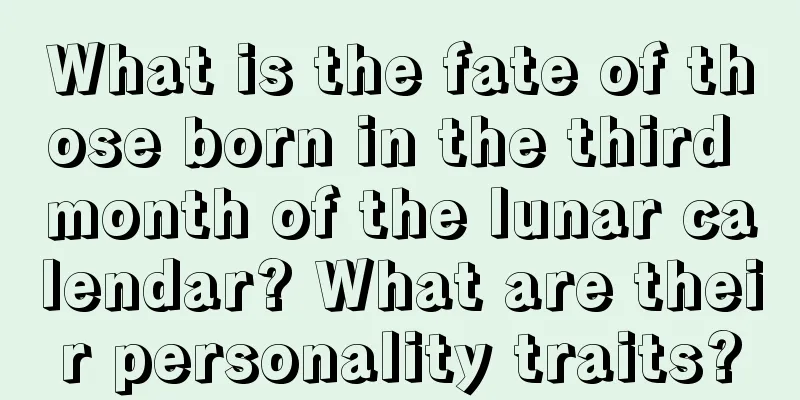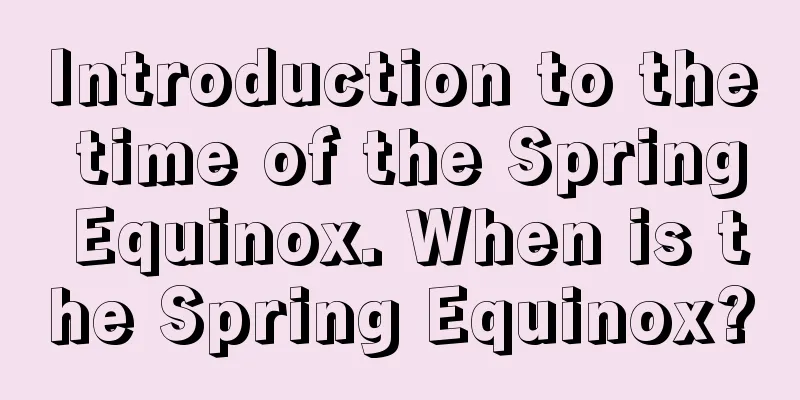What is the meaning of the Grain in Ear solar term? What solar term comes after Grain in Ear?

Grain in Ear is the third solar term in summer, but it is still some time away from the arrival of midsummer, and the temperature has not reached the unbearable high temperature in midsummer. So what is the meaning of the Grain in Ear solar term? Shui Mo Network has prepared relevant content for every day of the fifth lunar month in 2022. If you want to know more details, please follow Shui Mo Network!What is the meaning of the Grain in Ear solar term?Grain in Ear is the time when rice is planted in the south and wheat is harvested in the north. The words "plant" and "harvest" reveal the important events in life, which are planting and reaping. If you plant, you will reap. If you plant well, you will reap well.The climatic characteristics of Grain in Ear are significantly increased temperature and abundant rainfall. Such unique climatic conditions are very suitable for both sowing and transplanting. Therefore, in agricultural production, we must seize the time, rush to plant major spring crops, and transplant rice in time. Therefore, people call "Mangzhong" "busy planting", which indicates that this season is the busiest season for agricultural cultivation. There is a folk proverb that "If you don't plant during Grain in Ear, it will be useless", which means that this season is already a late sowing period and you have to rush to sow. When the Grain in Ear season comes, rice should be planted as soon as possible; if it is delayed, the yield will inevitably be low because the temperature will rise, the rice's vegetative growth period will be shortened, and the rice will be more susceptible to drought and pests and diseases during the growth stage. In most areas, Grain in Ear is the busiest time of the year for farming, as people are not only busy with harvesting, but also with sowing. What solar term comes after Grain in Ear?After Grain in Ear comes the Summer Solstice.The summer solstice is the earliest solar term to be determined among the 24 solar terms. In the seventh century BC, our ancestors used a gnomon to measure the sun's shadow and determined the summer solstice. According to the Kezunxiandu Manuscript, "When the sun reaches its northernmost point, the day is at its longest, and the shadow is shortest, it is called the summer solstice. 'Zhi' means "extreme." On the summer solstice, the sun's position directly above the ground reaches the northernmost point of the year, almost directly above the Tropic of Cancer (23°26' north latitude). It is the day with the longest daylight throughout the year in all parts of the Northern Hemisphere, and the higher the latitude, the longer the daylight. For example, the day length in Haikou, Hainan is a little over 13 hours, in Hangzhou it is 14 hours, in Beijing it is about 15 hours, and in Mohe, Heilongjiang it can reach more than 17 hours. North of the Arctic Circle, the sun stays above the horizon all day, making it the day with the longest polar day in the Northern Hemisphere. At the same time, for areas on and north of the Tropic of Cancer, the summer solstice is also the day when the sun is highest at noon in the year. In the Beijing area, the sun's altitude at noon on the summer solstice reaches 73°32′. On this day, the Northern Hemisphere receives the most solar radiation, nearly twice as much as the Southern Hemisphere. |
Recommend
Is it not advisable to travel the day before Cold Dew in 2020? What is the meaning and harm of Cold Dew wind!
Introduction: It is necessary to choose an auspici...
The lunar calendar for March 23, 2018, is it a good day?
The Fortune Teller website has carefully compiled...
Stars born on Children's Day, a list of famous people born on June 1st at home and abroad
International Children's Day, also known as Ju...
What are the customs in various parts of China when the Dragon Raises its Head on February 2?
Our country has a vast territory and a large popul...
When is the Spring Equinox in 2018? What time?
Introduction: Spring is the season when all things...
What date in the Gregorian calendar does the fourth day of the eighth lunar month in 2019 correspond to? Good or bad days
Every day has its own attributes. Some people div...
Where is the auspicious direction for the God of Happiness on April 23, 2017 in the lunar calendar?
Introduction: The biggest feature of the God of Jo...
Is it a good idea to get engaged on the 24th day of the twelfth lunar month in 2020? Will there be a holiday for the Little New Year?
Introduction: You need to choose an auspicious day...
What is the date of Frost’s Descent on October 23, 2018? Is it a good day to bury the deceased on Frost’s Descent?
Introduction: Burial also requires choosing a date...
What is the direction of the God of Happiness on November 25, 2021 in the lunar calendar? In which direction?
“In eleventh month, Yin is born, and it is time to...
What date is the ninth day of the first lunar month in 2020? Are there any special customs?
The first month of the lunar calendar is the begin...
What are the auspicious days for traveling in May of the lunar calendar in 2020?
Whether you are going out to work and make money, ...
Is the fate of a baby girl born on February 22, 2019 in the lunar calendar good?
Is the fate of a baby girl born on February 22, 20...
Is it suitable to pick up the car on the seventh day of the twelfth lunar month in 2017?
What days in the twelfth month of the lunar calen...
Can I take a shower on the second day of the Chinese New Year? What are the taboos to pay attention to on the second day of the first lunar month?
Introduction: The Spring Festival is an important ...









